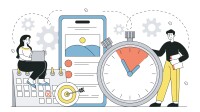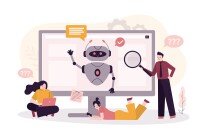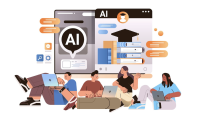Search
There are 23 results.
Category
Tag
Tag
All (23)
Active Learning (1)
Annotated Bibliography (1)
Assessments (5)
Authentic Activities (1)
Backwards Design (1)
Canvas (1)
Collaboration (1)
Competency-Based Education (5)
Content Creation (6)
Course Materials (1)
Course Preparation (1)
Equity (1)
Feedback (1)
Formative Assessments (2)
Generative AI (7)
Grading (2)
Learning Objectives (3)
Rubrics (1)
Universal Design for Learning (UDL) (2)
Workforce Development (1)
Introduction to Competency-Based Education
As higher education evolves to meet the needs of today’s diverse learners, competency-based education (CBE) is gaining traction for its student-centered approach and promises of affordability and workplace preparation. According to a 2020 survey, 128 unique institutions were operating a total of 1,057 CBE programs between 2018 and 2020, and 82% of responding institutions expected CBE programs to grow further between 2020 and 2025 (American Institutes for Research [AIR], 2021). While interest in CBE may be growing, most institutions remain in the early planning stages.
Annotated Bibliography: Competency-Based Education in Higher Education
Competency-based education (CBE) is gaining momentum in higher education as a strategy to enhance flexibility, promote workforce alignment, and improve outcomes for adult and nontraditional learners. For institutional leaders, designing or expanding CBE programs requires not only a clear understanding of core CBE principles but also a strategic approach to implementation, curricular redesign, equity, and evaluation.
Beyond Traditional Grades: Alternative Assessment Methods
As educators navigate the challenges and opportunities presented by generative AI (genAI), many are reconsidering traditional assessment approaches. Alternative assessment methods offer innovative ways to evaluate student learning that go beyond conventional grading systems, focusing on authentic learning, skill development, and meaningful engagement. These approaches not only address the challenges posed by AI but also align with research on effective learning and motivation (Furze, 2023; Pitts Donahoe, 2023).
Workforce Development Today
Our workforce has undergone a profound transformation, driven by emerging technologies, automation, and shifting business priorities (Silva, 2024). These forces are reshaping job roles, workflows, work environments, and the skills required to succeed. The global pandemic was also a major accelerator, pushing these changes forward across industries. As a result, the rapid evolution of work has created an increasing need for continuously updated and, in many cases, entirely new skill sets.
Fostering Deep Learning and Motivation in the AI Era
As generative artificial intelligence (genAI) reshapes the educational landscape, faculty must rethink traditional assessment strategies to maintain academic integrity and real-world relevance. This piece explores strategies for creating effective assessments in an AI-mediated world, focusing on two key areas: collaborative activities that develop essential human skills, and formative assessments that emphasize personal growth and deep learning. These approaches not only address concerns about AI misuse but also prepare students for future workplaces where human capabilities will complement AI tools.
The Need to Rethink Assessments in the Age of Generative AI
The rapid advancement of generative artificial intelligence (genAI) technologies has sent shockwaves through the education sector, sparking intense debates about academic integrity, assessment practices, and student learning (Roe et al., 2023; Rudolph et al., 2023; Susnjak & McIntosh, 2024; Swiecki et al., 2022; Yeo, 2023). Since the public release of ChatGPT in November 2022, educators have grappled with concerns about cheating and the potential erosion of traditional academic values (Gorichanaz, 2023; Sullivan et al., 2023). However, as our understanding of genAI capabilities evolves, so too must our approach to assessment and teaching (Lodge et al., 2023).
Developing AI Literacy Across the Curriculum: A Guide for Programs and Faculty
The rapid integration of AI into professional practice across disciplines makes AI literacy increasingly crucial, not just for technology-focused fields but for all areas of study. Even faculty who are skeptical of AI's value need to consider how it's transforming their disciplines. For example, scientific fields are seeing AI adoption in literature reviews, experimental design, and data analysis. In the humanities, AI tools are already being used for textual analysis, translation, and content creation. Creative disciplines must grapple with AI's impact on artistic production and copyright. Professional programs face increasing pressure from employers who expect graduates to understand AI applications in their field.










